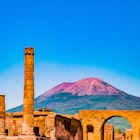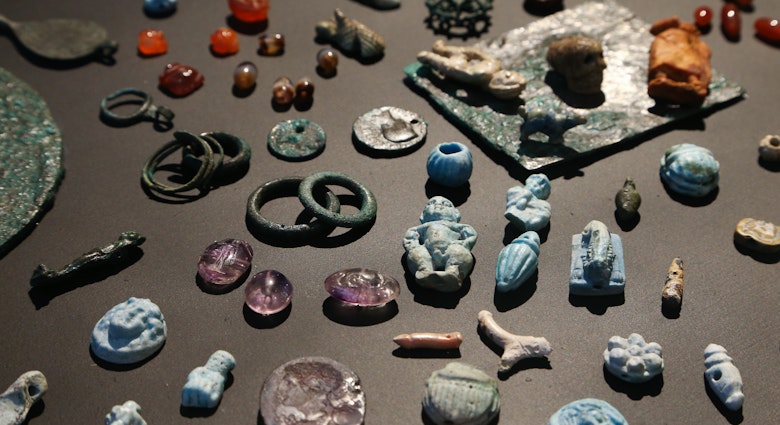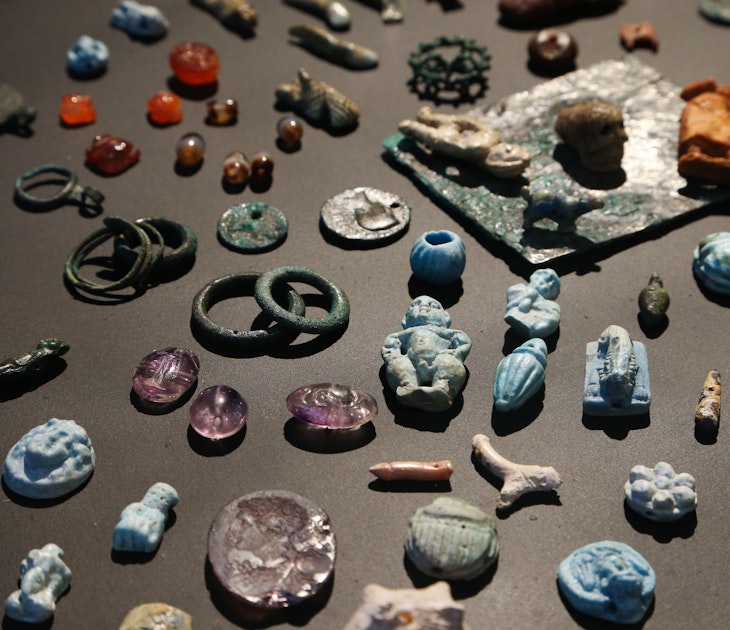
Street food stall discovered in Pompeii reveals dining habits of Ancient Romans

Jan 4, 2021 • 2 min read

An ancient snack bar was discovered in Pompeii, shedding more light into the life of residents before the volcanic eruption ©Luigi Spina
The current conservation project in Pompeii has unearthed spectacular finds in recent years. The latest is an incredibly well-preserved snack bar that offers insight into the dining habits of Ancient Romans.
It's the equivalent of a modern-day food stall, and would have served ready-made hot food and wine to Ancient Romans before it was buried under ash and lava in the volcanic eruption of 79 AD. Also known as a thermopolium, these street stalls were common in Rome. Pomeii alone had 80 of them. But this particular one has sparked excitement among researchers because it's incredibly well preserved. Fresco art still adorns the walls of the counter with a scene of gladiators in combat and an image of Nereid riding a seahorse, along with what appear to be menu items such as mallard duck and rooster.

Customers who visited could choose from a selection of hot dishes that were kept warm in terracotta jars set into cylindrical holes in the bar. Dishes like duck, fish, pork, goat and "a concoction involving snails, fish and sheep," according to the New York Times — that may have been a soup or a stew. Traces of nearly 2000-year-old food residues and animal bones were found at the site, which helped archaeologists establish these specific menu items. Researchers also came across an earthenware vessel, that had contained wine, and crushed fava beans in one pot, which they believe were used to enhance the flavour of some dishes.
Pompeii: get to know Italy’s legendary ruined city

The street stall was unearthed in an area known as Regio V in Pompeii in 2019, but was only recently fully excavated. A cistern and water fountain were also found nearby. The finds will be analyzed in a lab, with particular attention paid to the contents in the terracotta jars so we might get a better understanding of the typical Ancient Roman diet. Researchers say this is just the beginning of this exciting discovery.
“As well as being another insight into daily life at Pompeii, the possibilities for study of this thermopolium are exceptional, because for the first time an area of this type has been excavated in its entirety, and it has been possible to carry out all the analyses that today’s technology permits,” said Massimo Osanna, director of Pompeii Archaeological Park.

Pompeii is currently closed with coronavirus restrictions, but this latest find could be available for public viewing when the park reopens at Easter.
You might also like:
Curious tales of why tourists have been returning “cursed” items to Pompeii
Take a virtual drone tour of the fascinating new excavations in Pompeii
Explore related stories



 HistoryInside Pompeii's House of Lovers as it reopens to the public after 40 years
HistoryInside Pompeii's House of Lovers as it reopens to the public after 40 yearsFeb 19, 2020 • 2 min read
 HistoryOne of the most well-preserved villas of Ancient Rome reopens after 35 years
HistoryOne of the most well-preserved villas of Ancient Rome reopens after 35 yearsOct 24, 2019 • 2 min read


 Art and CultureVisiting Pompeii in 2023? Exciting discoveries reveal new truths about the doomed city
Art and CultureVisiting Pompeii in 2023? Exciting discoveries reveal new truths about the doomed cityMar 17, 2023 • 6 min read
 ArchaeologySee inside one of Pompeii's grandest villas as it reopens for the first time in 20 years
ArchaeologySee inside one of Pompeii's grandest villas as it reopens for the first time in 20 yearsJan 12, 2023 • 4 min read









